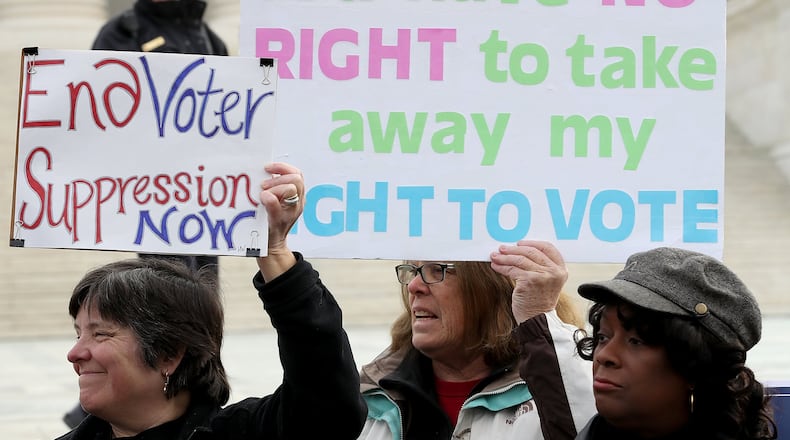“We have no authority to second-guess Congress or to decide whether” Ohio’s law “is the ideal method for keeping its voting rolls up to date,” Alito wrote. “The only question before us is whether it violates federal law. It does not.”
MORE >>> Forklift falls on man at Moraine business, police say
The justices overruled a 2016 decision by a three-judge panel of the 6th U.S. Circuit Court of Appeals. In that decision, the court sided with those who argued that Ohio’s system violated federal law by discriminating against low-income voters.
Ohio Attorney General Mike DeWine and Ohio Secretary of State Jon Husted both applauded the ruling, with Husted saying it was “a victory for election integrity and a defeat for those who use the federal court system to make election law across the country.”
By contrast, U.S. Sen. Sherrod Brown, D-Ohio, a former secretary of state in Ohio, assailed the decision, saying, “Ohio should be working to make voting easier, not harder. Instead, today’s decision empowers Ohio to further strip away the right to vote for thousands of Ohioans, threatening the integrity of our state’s election process.”
In a tweet, the ACLU of Ohio, which challenged the law, called the ruling a major blow to democracy.”
The decision could emerge as a major election issue this year. DeWine is the Republican candidate for governor in this fall’s election, with Husted as his lieutenant governor running mate. Democrats have sharply opposed Ohio’s system.
MORE >>> Neighbors: Medical marijuana shops will attract problems
Joining Alito to form the majority were Chief Justice John Roberts, and Justices Clarence Thomas, Neil Gorsuch, and Anthony Kennedy. Justices Stephen Breyer, Elena Kagan, Sonia Sotomayor, and Ruth Bader Ginsburg dissented.
Sotomayor wrote that Congress passed what is known as the National Voter Registration Act of 1993 “against the backdrop of substantial efforts by states to disenfranchise low-income and minority voters, including programs that purged eligible voters from registration lists because they failed to vote in prior elections.”
“The court errs in ignoring this history and distorting the statutory text to arrive at a conclusion that not only is contrary to the plain language of the (1993 law) but also contradicts the essential purposes of the statute, ultimately sanctioning the very purging that Congress expressly sought to protect against,” she wrote.
RELATED>>>Husted says replacing voting machines will be costly
That prompted a stinging response from Alito who wrote that Sotomayor’s dissent “says nothing about what is relevant in this case – namely the language of the” 1993 federal law. He described as “misconceived” her assertion that minority and low-income voters would be disenfranchised.
The Ohio law provides what the state considers a housekeeping device to determine if a voter has left the state. If a voter doesn’t cast a ballot during a two-year span, he or she receives a notice from the registered voter’s county board of elections to check if they still live there.
If they don’t reply, they get a variety of mailings over the ensuing four years, such as request for absentee ballots, a change of address card, and a notice on polling sites.
RELATED>>>Supreme Court to hear arguments over Ohio voter purge law
If the voter responds to any of those notices — or votes even once during that four years — they remain registered. If elections officials don’t hear from a voter in the six-year period, their name is purged from the list of eligible voters. The voter can register again to regain eligibility.
“It is undisputed that Ohio does not remove a registrant on change-of-residence grounds unless the registrant is sent and fails to mail back a return card and then fails to vote for an additional four years,” Alito wrote.
The procedure has been the same for years, under both GOP and Democratic secretaries of state.
Attorneys for the state insisted that voters are not scrubbed from the registration rolls simply because they failed to vote. But opponents responded that because many people do not cast ballots in off-year elections, the state launches a procedure that could eventually lead to a resident being dropped from registration rolls.
State Rep. Kathleen Clyde of Kent, the Democrat running for secretary of state, said she was disappointed in the ruling and called on Husted to “leave eligible voters on the rolls and only remove people for legitimate reasons such as death or moving out of state.”
“Justice Alito’s opinion only holds that federal law allows this purging, it does not suggest that federal law requires it nor that it is good policy,” she said. “Under this decision, whether or not to purge is left to the states.”
Husted’s office did not immediately respond to questions about his office’s plan to purge additional voters in the wake of the court’s ruling.
In the 2016 elections, the ACLU determined that roughly 7,500 people in Ohio showed up to vote only to discover that they had been purged.
And while those 7,500 voters would not have been enough to tip the presidential election from President Donald Trump to Democratic nominee Hillary Clinton, scores of Ohio elections have been decided by a handful of votes.
RELATED>>>Election squeakers from last November
Randy Ludlow of the Columbus Dispatch contributed to this story.
About the Author

